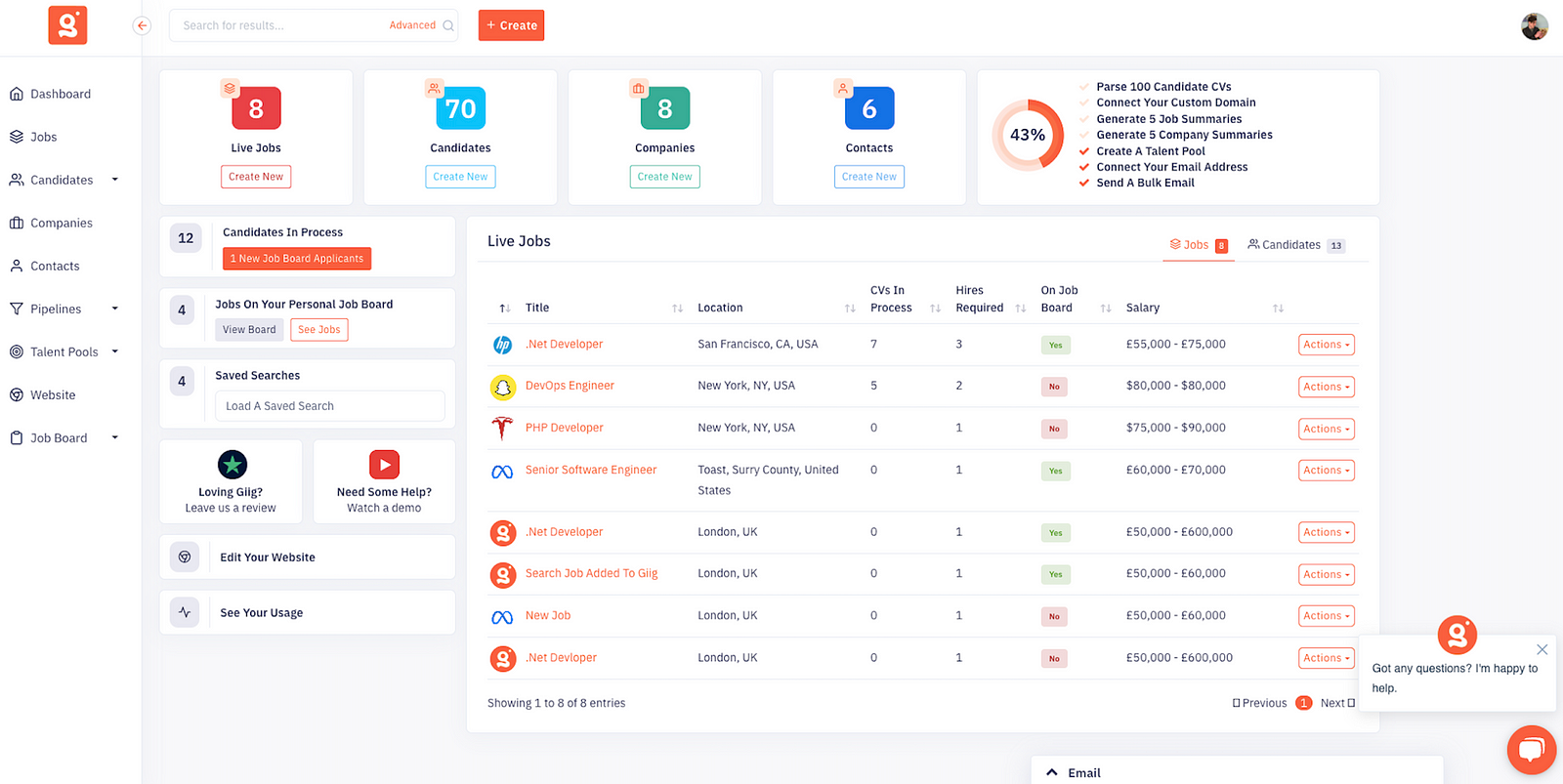This website uses cookies so that we can provide you with the best user experience possible. Cookie information is stored in your browser and performs functions such as recognising you when you return to our website and helping our team to understand which sections of the website you find most interesting and useful.

Finding the right tools to streamline your workflow is crucial in recruitment. Utilising the best recruitment CRM for staffing companies can be a game-changer.
With so many options on the market, choosing the best CRM for recruiting companies can feel overwhelming. This blog post is here to help! We’ve analyzed the top 5 Recruitment CRMs in 2024, considering features, pricing, and ideal users. Whether you’re a freelance recruiter or a large agency, we’ll guide you towards the perfect solution to supercharge your recruitment process.
The Top 5 Recruitment CRM for Staffing Companies
1. Giig Hire CRM
Suitable for: Freelance recruiters and small recruitment businesses.

Summary: Giig Hire is a free recruitment software platform that offers a variety of tools to help freelance recruiters and small agencies manage their workflow, find clients, and fill jobs. Giig Hire’s all-in-one recruitment platform offers features such as an Applicant Tracking System (ATS), website builder, and job board.
The Giig Hire CRM is a great CRM for staffing companies and freelance recruiters seeking a free and user-friendly solution to manage their core recruitment activities.
Key features:
- Free applicant tracking system (ATS)
- Customer relationship management (CRM)
- Free website builder with the ability to connect a custom domain
- Email integration and tracking with bulk email capabilities
- Giig Hire job board posting
- AI-powered features
- Talent pools, CV paring and mass imports
- Drag and drop pipelines
- Advanced searches
Pricing information:
- Forever Free plan available
- Paid-for plans are from £9.99 per month
- Pricing link here
2. Zoho Recruit
Suitable for: CRM for staffing companies and large HR departments.

Summary: Zoho Recruit, a cloud-based recruitment platform owned by Zoho. The platform simplifies the hiring process for staffing agencies and HR departments. It combines features typically found in applicant tracking systems (ATS) with customer relationship management (CRM) tools. This lets them manage everything involved in finding and bringing on new hires, from attracting candidates to welcoming them to the team.
Key features:
- Job board posting
- Social recruiting
- Mobile App
- Database management
- Collaboration features
- Hiring pipeline
- Video interviewing
- Automated workflows
- AI-powered recruitment
Pricing information:
- Paid for plans from £24 per month
- There is a 15-day free trial available
- Pricing link here
3. HubSpot CRM
Suitable for: Businesses of all sizes (especially startups and SMBs) looking for a free or affordable CRM with marketing, sales, and service features. Great CRM for staffing companies of various sizes.

Summary: While HubSpot might be famous for its sales and marketing tools, recruiters can benefit from it as well. This free, cloud-based CRM goes beyond lead tracking and customer service. It offers a feature set specifically designed to streamline recruiting tasks, manage candidate contacts, and improve your overall hiring process.
Key features:
- Database and candidate pipeline management
- Reporting and analytics
- Deals pipeline
- Task management
- Team collaboration
- Email integration and tracking
- Sales automation tools and email sequencing
Pricing information:
- Free plan available
- Paid-for plans are from £18 per month
- They offer a 14-day free trial on the paid plans
- Pricing link here
4. Manatal
Suitable for: Recruitment agencies working with multiple clients.

Summary: Manatal is a recruitment software company based in Bangkok, Thailand. It is an all-in-one recruitment CRM that simplifies hiring for staffing agencies and HR departments. It streamlines the process by organizing candidates, using AI to find the best fit, and offering features like drag-and-drop pipelines, messaging, and social media insights. Designed for small businesses, it includes a career page builder, Chrome extension for easy resume capture, compliance tools, and Google Calendar integration to help manage high applicant volumes and improve collaboration.
Key features:
- Applicant Tracking System (ATS)
- Candidate Relationship Management (CRM)
- Multiple platform job posting
- AI-powered job description generator
- Interview scheduling tools
- Collaboration features
- Reporting and analytics
- Integrations (Google Calendar and G Suite)
- Mobile-friendly
Pricing information:
- Paid-for plans are from £16 per month
- 14-day free trial
- Pricing link here
5. Recruiterflow
Suitable for: CRM for staffing companies, staffing agencies and executive search firms that are medium to large in size.

Summary: Recruiterflow simplifies hiring for staffing agencies by combining applicant tracking with CRM features. This lets them find top talent beyond job boards, automate outreach with targeted campaigns, and keep everyone on the hiring team informed through centralized communication. Plus, its user-friendly interface makes the process smoother for both recruiters and candidates.
Key features:
- Advanced recruiting automation
- Pipeline management
- Email automation
- Real-time reporting
- Open API
- Job board integration
- Reporting and analytics
Pricing:
- Paid-for plans are from £85 per month
- 14-day free trial available
- Pricing link here
The Importance of a CRM for Staffing Companies
1. Streamlined Workflows: A CRM centralizes information on both candidates and clients, eliminating the need to sift through scattered spreadsheets and emails. This allows recruiters to focus on what they do best — building relationships and filling positions.
2. Enhanced Candidate Relationships: A CRM fosters stronger connections with candidates. It helps track interactions, qualifications, and preferences, enabling recruiters to personalize outreach and nurture relationships with both active and passive job seekers.
3. Improved Client Satisfaction: Understanding client needs is vital. A CRM facilitates this by storing detailed client data, past placements, and communication history. This empowers recruiters to make better matches and provide a more responsive service.
4. Data-Driven Decisions: A CRM is a treasure trove of valuable data. It can track metrics like time-to-fill, placement success rates, and client satisfaction. This data allows staffing companies to identify areas for improvement and optimize their recruitment strategies.
5. Efficient Communication: Communication is key in staffing. A CRM streamlines communication with both candidates and clients. Features like automated email campaigns and task management ensure everyone stays informed and on the same page.
A CRM for staffing companies is an investment that pays off. By streamlining workflows, nurturing relationships, and providing valuable data, a CRM equips staffing companies to deliver exceptional service and achieve long-term success.
Conclusion:
The perfect recruitment CRM for staffing companies depends on your specific needs and budget. Whether you’re a freelance recruiter or a large agency, there’s a solution out there to supercharge your recruitment process.
When identifying the best CRM for your staffing company, consider the following factors when making your decision:
- Team size and needs: Do you need a free option for a small team, or feature-rich software for a large agency?
- Features: Prioritize the functionalities most important to your workflow, like candidate sourcing, automation, or client management.
- Budget: CRM options range from free plans to enterprise-level pricing.
We recommend taking advantage of the free trials offered by most providers to test-drive the software and see which one feels like the best fit.
With the right CRM for recruiting, you can streamline your workflow, build stronger relationships with clients and candidates, and ultimately find the perfect talent for every opportunity.
Further Reading:
